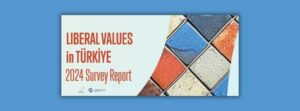EXECUTIVE SUMMARY
As a continuation of the “Press Freedom in Turkey” reports published in the past years, Burak Bilgehan Özpek wrote the report “Press Freedom in Turkey 2022” for the Freedom Research Association to present an up-to-date analysis of the constantly changing press freedom conditions in the country. The report aims to examine the situation of press freedom in Turkey in 2022 within the framework of new dynamics and actors and to explain the problems. Press freedom in Turkey has been analyzed and interpreted in political, economic, and social contexts under the titles of the legal framework, economic dependency, and polarization-discrediting.
In the report, Özpek states that the general character of the society is destroyed under oppressive administrations like Turkey, and the institutions affiliated with the government and as well as the opposition have collapsed. Media freedom also suffers from this collapse and free media cannot emerge in such an environment. In countries like Turkey, which can be defined as competitive authoritarian, although some areas referred to as micro power areas have been freed, it is not possible to escape from total corruption.
In the destruction of press freedom, authoritarian regimes take the law as a reference while penalizing press organizations and journalists. The Anti-Terror Law, Law Against Insulting the President, MIT Law, and Law on Protests constitute the majority of the legal grounds on which journalists are prosecuted in Turkey. According to MLSA data, non-governmental organizations operating in Turkey, as of August 2022, there are 59 imprisoned journalists in the country. This number is 69 according to Expression Interrupted, and the number given for journalists whose trials are still pending is 108. These penalties are a method frequently used by authoritarian regimes to punish journalists, intimidate other journalists and maintain a climate of fear. The government may give the impression that it is opening up to the opposition press by periodically loosening the ropes depending on the political conditions. However, this situation is far from being systematic and institutional, and at the same time, violations of freedom of the press continue.
In 2022, although media organizations in Turkey were not given the penalties of closure and confiscation, they were indirectly hit as a result of economic difficulties. Many media outlets were shut down and many local journalists lost their jobs since local newspapers are heavily dependent on the revenues of the Press Advertisement Agency (BİK) and these revenues were insufficient in the face of rapidly increasing inflation, pushing local newspapers to merge. The shutdowns in digital media occurred as a result of the violation of the community guidelines of the digital platform, rather than the request of the government.
Broadcasting bans and administrative penalties were disproportionately imposed by RTÜK on opposition television channels, just like in previous years. According to Cumhuriyet Newspaper, RTÜK has fined five opposition television channels 91 times in the last 1.5 years. Considering the financial burden that these penalties bring to the channels, it can be said that the main purpose is to force the channels to close down. The fines received by pro-government channels are both few and differ from opposition channels in terms of their reasons. Opposition channels were penalized for political content that could be described as anti-government, while pro-government channels were penalized for daytime programs. Some pro-government news channels were not penalized at all.
It is stated that the institution has lost its impartiality and acts entirely with partisan motives. As the most important example of this, RTÜK President Ebubekir Şahin not only personally supported the anti-LGBT+ march on September 9, 2022, but also broadcast the rally announcement free of charge on television channels and put the announcement in the “Public Service” category on the official website of RTÜK, to gain the appreciation of political actors. Although Şahin based this decision on Article 9 of the Public Ads Directive, which includes the authority that public service announcements can also be recommended by the President of the Supreme Council in cases where there is a public interest, this situation is far from being legal according to Article 8.1.a of the Law No. 6112 on the Establishment of Radio and Television and Broadcasting Services. Violation of such laws is explained as a way of demonstrating loyalty by partisan bureaucrats.
Online news sites also suffered from closures and censorship. In 2021, 49 news sites were closed down, and with 134 decisions, access to a total of 1593 news related to the government, Erdogan and his family, and companies close to the government were blocked.
Social media has also been heavily affected by bans and demands for private information and censorship. According to Free Web’s 2021 analysis, Turkey requested the information of 351.471 users and the removal of 211.055 posts from Facebook, ranking 7th in the world in both categories. The government followed a more aggressive policy for Twitter and made Turkey the country that requested the most blocks to access the content after China and Russia. While requests were largely unrequited on Facebook, the request approval rate for Twitter was 63%.
Article 29 of the widely debated disinformation law, which was passed in the parliament in 2022, makes it a crime to spread false information publicly and provides for imprisonment. The point to be noted here is that there is no existing process that is transparently shared with the public, and it is difficult to access information on these issues. This law grants the government a wide interpretation power and makes the government’s declarations the objective criteria of truth. Information will not become the subject of public debate, as both cannot be confirmed and alternative views will be penalized. At the same time, it is difficult to detect an organized disinformation campaign as people interact with what the people they follow write. Accusing people with similar identities, ideologies and institutional ties with organized crime will also include these groups in the definition of crime.
As mentioned in previous reports, the government creates dependent media using public-affiliated companies and Wealth Fund companies using their advertising budgets. Millions of liras of taxpayer money are spent on the inefficient financing of the least followed media outlets. Since the Wealth Fund is exempt from the audit of the Court of Accounts and the general political atmosphere does not allow transparency, public-affiliated companies spend their advertising revenues inefficiently and use their advertising budgets to finance pro-government media. Journalist Hasan Basri Akdemir stated that Halk TV, TV5, Tele 1, and KRT do not receive any advertisements from public-affiliated companies and public institutions, and interestingly, even among pro-government media organizations, there is great discrimination in favor of Turkuvaz Media. The gap between the advertising times given by these companies and institutions to the channels reveals the situation strikingly.
At the same time, as in the example of the cancellation of the right of Evrensel Newspaper to publish official announcements and advertisements by the decision of the BİK, the opposition media is punished financially by using public power in a partisan and arbitrary way. BİK imposed 97% of the fines on the opposition media in 2020. In 2022, the Constitutional Court found the newspaper justified in the case to appeal against a sentence imposed by the BİK and concluded that the sentence violated the freedom of the press and expression. However, this situation did not change the attitude of the partisan bureaucracy, which had no concern to act within the constitutional framework.
As a result of the general spread of this inefficient structure, the opposition channels that are less followed became a part of this dependency mechanism, and they were able to survive thanks to the advertising expenditures of the companies affiliated with the municipalities under the opposition administration. Although this situation helps to preserve polyphony in Turkey to some extent, the potential dangers to press freedom should not be overlooked. The guarantee of a free press is that media organizations can function as market actors. In addition, as a result of the economic dependency on these political groups, the opposition media started to lose its neutrality and prefer certain names within the opposition. Some of the news of the Birgün and Sözcü newspapers that discredit Ekrem İmamoğlu is an example of this. This situation is a bad sign for press freedom.
Media organizations that do independent journalism through social media in Turkey are also trying to survive by financing themselves with the funds they receive from abroad. Some journalists laid off due to the corruption of the mainstream media, choose this route. These types of structures try to meet a need in an institutional and dignified manner and to maintain both cultural and intellectual power, rather than having personal monetary gain with foreign funds. However, the publications of these organizations can be considered activism rather than objective journalism, which is a handicap of the authoritarian regime. At the same time, these organizations are targeted and discredited by both the government and extreme right groups with absurd claims such as being spies of foreign countries.
Politics in Turkey has turned into a market with buyers and created an important playground for extremist and marginalized people who want to make a herd. This situation not only feeds the polarization between the government and the opposition but also causes polarization within the opposition. In the example of the far-right Victory Party’s systematic propaganda campaign targeting immigrants and asylum seekers in Turkey, this discourse was met with great response, and writers and intellectuals who made statements against the racist anti-immigration rhetoric were also targeted. At the same time, institutional opposition was also targeted for its cautious position. Although this campaign found many buyers, it ended with the warning of the government ally Devlet Bahçeli, and Ümit Özdağ, the leader of the Victory Party, remained silent. This indicates that the propaganda work was artificially organized by the Victory Party, and cyber security experts also support this view.
In Turkey, new lines of polarization are not established along the conservative-secular divide as in the past, but within the opposition groups. An extremist opposition that advocates a more authoritarian regime as an alternative to this type of government is in a much more preferable position for the government than the existing institutional opposition. Because such radical approaches wear out and weaken the institutional opposition. The marginalization of opposition is an opportunity for the competitive authoritarian government to be seen without an alternative and ultimately to survive. As a result of this, press freedom in Turkey is also hit on the axis of the opposition, in addition to the general.





